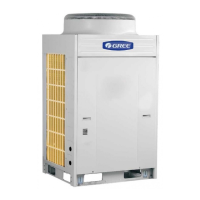54
DC Inverter Multi
VRF Service Manual
CONTROL
6 CENTRALIZED CONTROLLER
6�1 Central Control ZJ7011
6.1.1 Function
Main characteristics of Centralized Controller:
A set of Centralized Controller can control 64 communication modules and can connect to as much as 1024 indoor
units. It can conduct individual control with any separated area or unied control. It can monitor or control On/Off, Mode,
Temperature setting and Timer On/Off of indoor unit etc.
It can realize the central, single or select control to all indoor units.
It can organize several indoor units into groups as you desired and conduct unied control—Group select control.
Error contents are shown by codes. Corresponding communication module numbers of the indoor units with error
contents would blink for rapid inspection and repair (There is sound warning for a few errors).
Timer function. Every indoor unit can set Timer On/Off time by central, single or select control. Both Timer On
time and Timer Off time can be set at the same time, and it is available to set the timer to which day among the 7 days from
Sunday to Saturday works.
Clock function displays in year, month, day, hour, minute and week, and the clock can be manually adjusted.
Indoor and outdoor units online auto detect, display and working state indication.
Self-inspection function is remained.
Centralized Controller and several communication modules formed communication net, the length of
communication wire of the net can be as long as 1km (without using communication repeaters).
Note: this centralized controller shall be used with communication module ZJ301-W�
6.1.2 Operation View
ALL ON ALL OFF
PAGE
INDOOR UNIT
ERROR
AUTO
ROOM TEMP.
SWING SLEEP
MELT
TIMER
ON
OFF
SET TEMP.
ERR CODE
COOL
DRY
FAN
HEAT
AUTO
LOW
CHECK
MONITORING
DETECTING
TEST
MID
HIGH
CENTER
ADDRESS
INITIALIZE
SINGLE
SELECT
CTRL MODE
SYS
SET
IN-
DOOR
DO
MAIN
c c
Mon.
Tue.
Wed.
Thu.
Fri.
Sat.
Sun.
Year
MonD ate
Hour Min
CONTROL
CANCEL
CONFIRM
TIME
GROUPM ODE SPEED SWINGT IMER
SELECT
CONTROL
MODE
INDOOR/
DOMAIN
SYSTEM
/TEST
ON
OFF
1 2
345678
10111213
14
15
16
17
9
Fig.6.1.2

